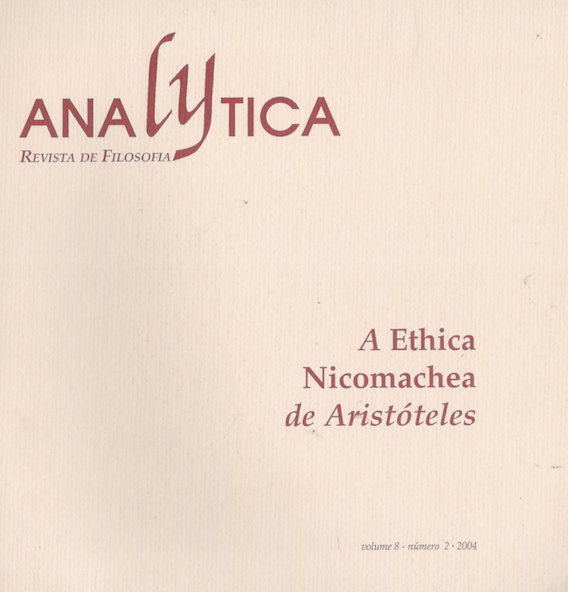Sobre a homonímia do bem
Resumo
Este artigo se propõe a analisar a crítica aristotélica da idéia do bem no quadro das críticas gerais à teoria platônica das idéias. A concepção criticada em EN I 6 é aquela do bem concebido como uma idéia, quer dizer, como um universal, comum à todas as coisas boas, separada delas, paradigmática, eterna e causa para as coisas boas de seu ser boas. Os argumentos de Aristóteles mostram a não-univocidade do bem, mas eles não chegam a mostrar que ele seja um pròs hén como o ser. O « argumento categorial » é sem dúvida o principal argumento do qual Aristóteles se serve para criticar a concepção platônica, mas ele não é o único nem o mais eficaz, pois ele se apóia sobre a homonímia do ser, diferente por natureza da homonímia do bem. O artigo tenta mostrar como Aristóteles recorreu à homonímia do ser para indicar analogicamente a homonímia pela convergência do bem.
Abstract
My purpose in this article is to analyze the Aristotelian criticism of the idea of good within the general scene of criticisms to the platonic theory of ideas. The conception that is criticized at EN I 6 is that of good as an idea, that is, as an universal, shared by all good things, separated from them, paradigmatic, eternal and cause for the good things of their being good. Aristotelian arguments show the non-univocity of good, but they do not get to show that it is a pròs hén as a being. No doubt the « categorical argument » is the main argument from which Aristotle criticizes the platonic conception, but it is not the only one neither is it the most effective, since it is based on the homonymy of being which is by nature different from the homonymy of good. This article attempts to show how Aristotle has recurred to the homonymy of being to analogically indicate the homonymy by convergence of good.
Downloads
Publicado
Edição
Seção
Licença
Os autores que publicam nesta revista concordam com os seguintes termos:
- Os autores mantêm os direitos autorais e concedem à revista o direito de primeira publicação, com o trabalho simultaneamente licenciado sob a Licença Creative Commons Atribuição-SemDerivações 4.0 Internacional (CC BY-ND 4.0), que permite a redistribuição, comercial ou não comercial, desde que a obra original não seja modificada e que seja atribuído o crédito ao autor.
- Os autores têm autorização para assumir contratos adicionais separadamente para distribuição não-exclusiva da versão do trabalho publicada nesta revista (ex.: publicar em repositório institucional ou como capítulo de livro), com reconhecimento de autoria e publicação inicial nesta revista.
- Os autores têm permissão e são estimulados a publicar e distribuir seu trabalho online (ex.: em repositórios institucionais ou na sua página pessoal) a qualquer ponto antes ou durante o processo editorial, já que isso pode gerar alterações produtivas, bem como aumentar o impacto e a citação do trabalho publicado (Veja O Efeito do Acesso Livre).


